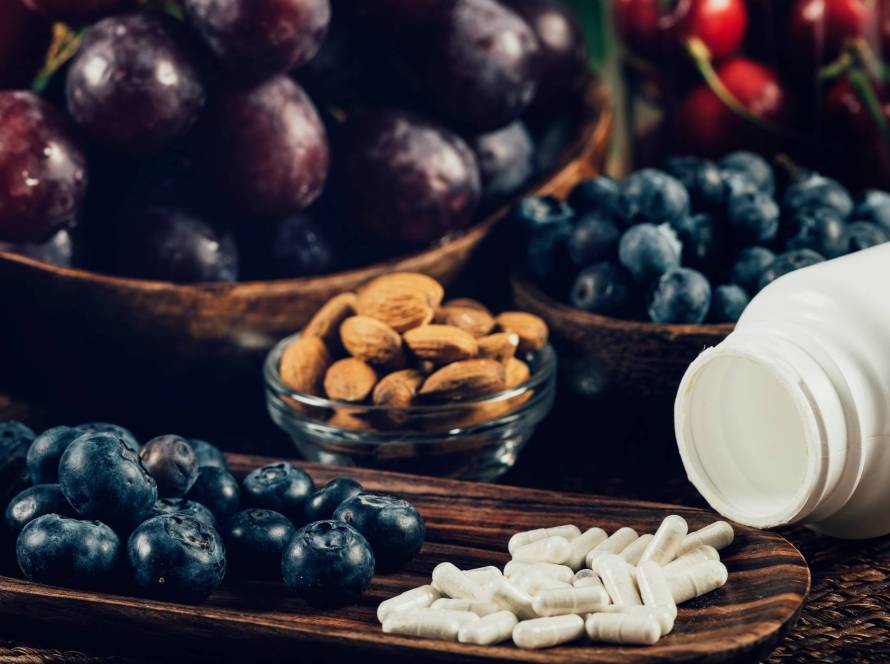In the quest for eternal youth, humanity has turned to various remedies, both ancient and modern. One of the more recent contenders in the anti-aging arena is resveratrol, a compound that has captured the attention of scientists and the public alike. But what is resveratrol and can it truly reverse aging?
This article aims to explore the potential of resveratrol as an anti-aging compound by examining its molecular structure, the science of aging and current research findings. We’ll also discuss its mechanisms of action, dietary source and safety considerations.
Understanding resveratrol: what is it?
Resveratrol is a naturally occurring compound found in several plants, including grapes, berries and peanuts. Known for its antioxidant properties, resveratrol has garnered attention for its potential health benefits, particularly in the realm of anti-aging. As we delve into the world of resveratrol, it’s vital to understand what this compound is and why it’s creating such a buzz.
This polyphenolic compound is part of a subgroup of compounds called stilbenoids. Resveratrol serves as a protective agent for plants, helping them resist environmental stressors such as infection and UV radiation. For us humans, the interest lies in these protective properties, which may translate into health benefits, especially in the context of aging.
Many of us first heard of resveratrol in connection with the so-called “French Paradox,” where moderate red wine consumption was linked to cardiovascular health benefits. Red wine, made from grapes rich in resveratrol, became synonymous with potential longevity. However, it’s important to note that while wine consumption is one way to ingest resveratrol, there are various other sources, both natural and supplemental.
The science of aging: how resveratrol fits in
Aging is a complex process influenced by genetic, environmental and lifestyle factors. Scientists have been studying the biology of aging for decades, seeking ways to slow it down or reverse its effects. Resveratrol has emerged as a promising candidate in this quest due to its potential to impact cellular mechanisms associated with aging.
The aging process involves the gradual decline of cellular function, leading to the deterioration of tissues and organs. Resveratrol is thought to influence these processes through its antioxidant properties, reducing oxidative stress and promoting cellular repair mechanisms. By mitigating damage at the cellular level, resveratrol may help maintain youthful function and vitality.
Furthermore, resveratrol has been studied for its role in activating sirtuins, a family of proteins linked to longevity. These proteins help regulate cellular health and have been associated with lifespan extension in various organisms. The potential of resveratrol to modulate these pathways makes it a compelling subject of research in the field of anti-aging science.
Can resveratrol reverse aging? Evidence from research
There is promising evidence suggesting resveratrol may help slow down certain aging processes.
Several studies in animal models have shown that resveratrol supplementation can improve healthspan and, in some cases, extend lifespan. Research on mice has demonstrated that resveratrol can mimic the effects of caloric restriction, a well-known intervention for extending lifespan.
Human studies, though limited, have shown some positive outcomes. Resveratrol has been linked to improved cardiovascular health, reduced inflammation and enhanced metabolic function. These benefits support the hypothesis that resveratrol may play a role in mitigating age-related decline. However, more extensive studies are needed to confirm its efficacy as an anti-aging intervention in humans.
Mechanisms of action: how resveratrol affects cellular aging
Understanding how resveratrol affects cellular aging involves exploring its molecular mechanisms of action. One of the primary ways resveratrol is believed to exert its effects is through the activation of sirtuins, particularly SIRT1. Activation of these proteins is associated with improved cellular health and longevity.
Resveratrol also influences other pathways involved in cellular aging, such as the AMP-activated protein kinase (AMPK) pathway. AMPK plays a vital role in energy metabolism and cellular maintenance. By activating AMPK, resveratrol may help enhance cellular energy efficiency and reduce the damage caused by metabolic stress.
Moreover, resveratrol’s antioxidant properties help combat oxidative stress, a major contributor to aging. By neutralizing free radicals and reducing inflammation, resveratrol can protect cells from damage, potentially slowing the aging process. These mechanisms collectively suggest that resveratrol may have a multifaceted role in promoting cellular health and longevity.
Resveratrol in the diet: natural sources and supplements
Incorporating resveratrol into our diet can be achieved through natural food sources and supplements. Some of the richest natural sources of resveratrol include:
- Red grapes: the skins of red grapes contain significant amounts of resveratrol, making red wine a popular source;
- Berries: blueberries, cranberries and mulberries are also good sources;
- Peanuts: a common snack, peanuts provide a moderate amount of resveratrol;
- Dark chocolate: beyond its delightful taste, dark chocolate contains some resveratrol.
For those looking to increase their resveratrol intake, supplements are widely available. These supplements offer a concentrated dose of resveratrol, often derived from Japanese knotweed, a plant rich in this compound. While supplements can be a convenient way to boost intake, it’s important to choose high-quality products from reputable manufacturers.
When considering resveratrol supplements, it’s crucial to consult with a healthcare provider to ensure they are appropriate for our individual health needs. Supplements should complement a balanced diet, not replace the nutritional benefits of consuming whole foods rich in resveratrol.
Potential benefits beyond aging: what research shows
Beyond its potential anti-aging effects, resveratrol has been studied for various health benefits. Research has explored its impact on cardiovascular health, cancer prevention and metabolic disorders, highlighting its versatility as a health-promoting compound.
Resveratrol’s cardiovascular benefits are perhaps the most well-documented. By improving endothelial function, reducing inflammation and lowering LDL cholesterol levels, resveratrol may contribute to a healthier heart and vascular system.
Emerging research also suggests resveratrol may have anti-cancer properties. Studies indicate that resveratrol can inhibit the proliferation of cancer cells and induce apoptosis or programmed cell death, in certain cancer types. While these findings are promising, more research is necessary to establish resveratrol’s role in cancer prevention and treatment.
Risks and considerations: is resveratrol safe?
While resveratrol offers numerous potential health benefits, it’s essential to consider its safety, especially when taken in supplement form. Generally, resveratrol is considered safe for most people when consumed in moderate amounts found in food. However, high doses from supplements may pose risks.
Potential side effects of resveratrol supplements include gastrointestinal discomfort, such as nausea and diarrhea. Additionally, resveratrol may interact with certain medications, including blood thinners and anti-inflammatory drugs, potentially altering their effectiveness. It’s crucial to discuss any supplement use with a healthcare professional to avoid adverse interactions.
Moreover, because research on long-term resveratrol supplementation is limited, its safety over extended periods remains uncertain. As with any supplement, it’s wise to approach resveratrol with caution and prioritize obtaining nutrients from a varied and balanced diet.
Future directions: ongoing research and clinical trials
The future of resveratrol research is promising, with numerous studies and clinical trials underway to explore its potential benefits and mechanisms. Researchers are investigating resveratrol’s effects on various age-related diseases, including Alzheimer’s disease, diabetes and cardiovascular conditions.
Advancements in technology and molecular biology are allowing scientists to delve deeper into resveratrol’s molecular interactions and pathways. This research may help identify specific populations or conditions where resveratrol supplementation could be most beneficial.
As the scientific community continues to explore resveratrol’s potential, we can remain hopeful that future discoveries will shed light on its role in promoting healthy aging. Ongoing research will help clarify its impact and guide recommendations for its use in both dietary and supplemental forms.
Resveratrol presents an exciting area of research in the quest to understand and potentially mitigate the effects of aging. While it may not be a magic bullet that can reverse aging entirely, resveratrol holds promise as a compound that could support healthy aging and longevity.


